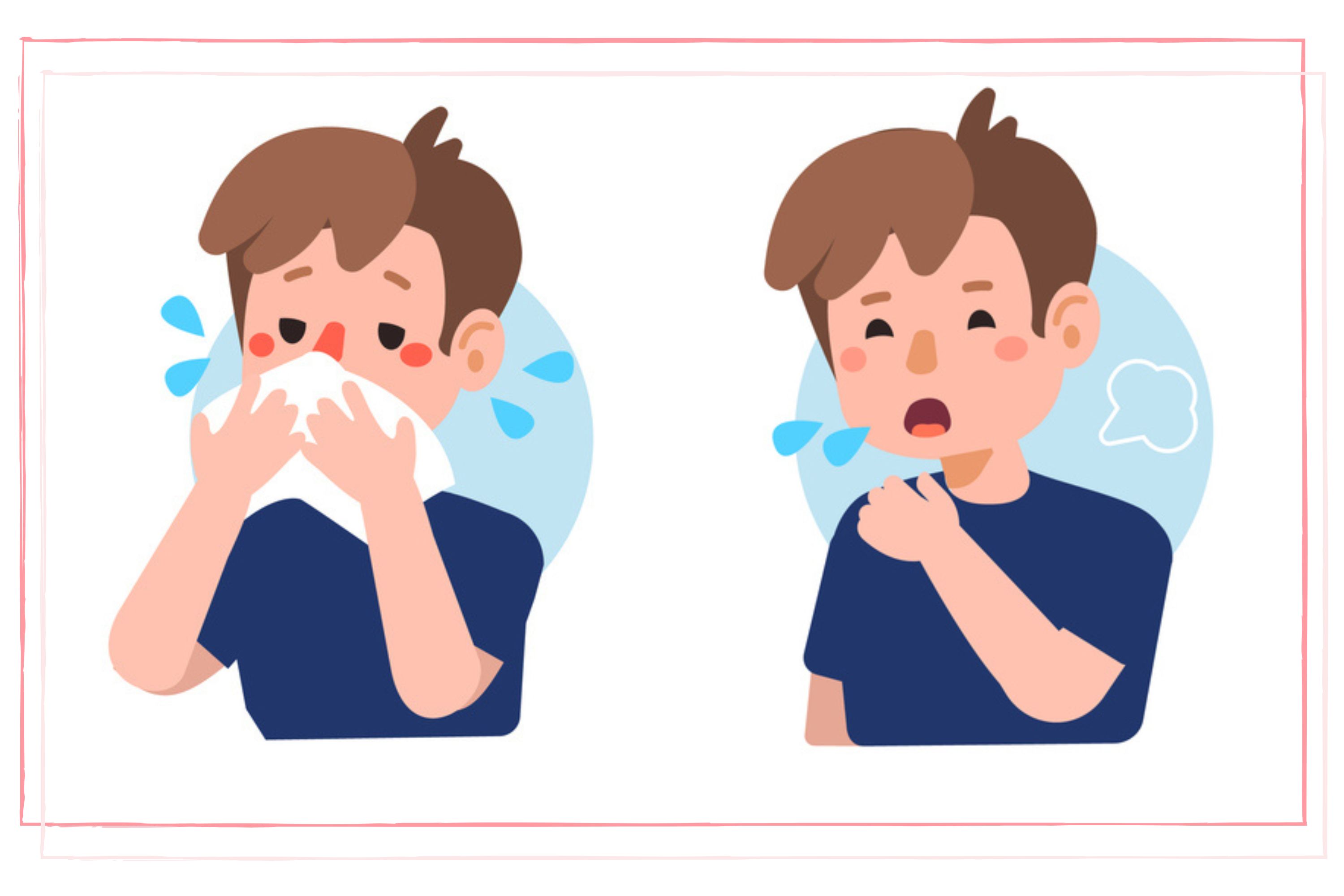What is whooping cough, why is it making a comeback and what to do if you think your child has it
Learn what is whooping cough, how its symptoms differ from the common cold, and why cases are increasing across the country. Plus, doctors share their key advice for parents - including when to seek urgent medical attention.


Whooping cough may sound like an illness from a bygone era, however it still poses a very real threat to babies in 2024 and cases are on the rise again in the UK.
The government recorded a 'continued increase' in whooping cough cases at the start of this year, and the highly contagious infection is most dangerous for babies aged under six months old because they are too young to be fully vaccinated against the bacterial infection as part of the NHS routine vaccinations for children.
It is crucial that you seek medical advice from a GP or your family doctor if you suspect your child may have whooping cough. This is because, while it shouldn’t cause serious side effects in older children and adults, whooping cough can cause concerning and sometimes life-threatening complications in babies – especially infants aged six months or younger.
We asked two doctors - Dr Sanjeev Kalia, a GP who is the lead in newborn baby health screening at his NHS practice, and Dr José Costa, a senior consultant paediatrician – for their evidence-backed advice on whooping cough and below they answer some of the most frequently asked questions about the infection and provide advice for parents on what to do if your child comes down with the ilnness.
Remember, always consult the latest NHS advice and seek medical attention as soon as possible if you think your child has whooping cough, especially if your baby is under six months old.
What is whooping cough?
Whooping cough is also known as pertussis, which means 'intense cough' and is caused by a bacterial infection of the lungs and breathing tubes. Both adults and children can catch the bacterial infection and it spreads very easily .
"It was first identified in the 1500s and before whooping cough vaccination became routinely available - in the 1950s in the UK - it was the leading cause of death in children under 14 years of age," explains Dr Costa. Reassuringly, although the illness is still very dangerous for small babies and the condition is still taken seriously, it is now only very rarely fatal and the whooping cough vaccine protects babies and children from getting the infection.
GoodtoKnow Newsletter
Parenting advice, hot topics, best buys and family finance tips delivered straight to your inbox.
Why is whooping cough making a comeback?
There have been concerns over rising whooping cough infections this year, with an increase in the number of cases in the UK recently. "As of March 2024, data from the UK Health Security Agency (UKHSA) showed there has been a continued increase - there were 553 confirmed cases in England in January, compared to 858 for the whole of 2023," shares Dr Kalia.
The UKHSA has linked an increase in cases to the combination of Covid-19 pandemic restrictions reducing social mixing and a decrease in whooping cough vaccination among children. "The latter has resulted in a decline in what is known as ‘herd effect’ immunity," explains Dr Costa. "This is where there is a high enough percentage of children vaccinated to protect the ones who are unvaccinated." He adds that this needs to be between 92 per cent and 94 per cent - as it has been amongst those under two years old, according to the UKHSA, since 1992.
What are the main symptoms of whooping cough?
There is a good chance that you might not realise your child is suffering from whooping cough at first because the initial signs of whooping cough are similar to coughs and colds in babies and children.
"The symptoms are initially similar to a common cold, such as a sore throat and runny nose," explains Dr Kalia. There may also be a low-grade temperature, sneezing and red, watery eyes.
However, after seven days, these previous symptoms fade and are replaced by - as the name suggests - a cough. "A dry cough starts, which is intermittent at first," explains Dr Costa. "This will then evolve into an uninterrupted cough." Bouts of coughing can sometimes last for a few minutes and worsen at night. "As the cough ceases and the child takes a deep breath, there will be a ‘whoop’ - creating the distinctive whooping cough sound - due to the partially closed airway," Dr Costa continues.
Dr Kalia adds, "The cough can also be accompanied by a thick mucus which can lead to a child vomiting, and in young infants it can cause them to have difficulty breathing after a coughing bout - meaning they may turn blue or grey." For all youngsters, while the cough tends to peak over two weeks, it can last months, and be distressing as well as tiring for them.
What is the difference between whooping cough and croup?
"The main distinction between the two is the type of cough, which in croup sounds more like a barking seal as opposed to the ‘whoop’ sound in pertussis infections," explains Dr Kalia. "In addition, croup is a viral infection which lasts a few weeks at most whereas whooping cough is bacterial and can hang around for several months."
Dr Costa notes: "Whooping cough is caused by a bacteria, while croup is triggered by a virus. While the former can be treated with antibiotics, the latter needs strong steroids to bring the inflammation down." Despite their differences, he adds, "both are quite serious, and if left unattended, can be life threatening," emphasising how important it is to seek medical advice from your GP or family doctor straightaway.
What to do if you think your child has whooping cough
The first thing you should do if you think your child has whooping cough is seek advice from your doctor with urgency. "You should consult your GP as soon as possible to confirm the diagnosis and seek treatment," insists Dr Kalia.
As whooping cough is highly contagious, it's advisable to call your GP or doctor first before taking your child in to the clinic. This is because your GP surgery may suggest a phone consultation in the first instance. Apart from taking them to the doctor, you should keep your child at home and away from public settings as if they have whooping cough there's a chance they will spread the infection to others.
While it is important for children of any age to be seen by a doctor if they have whooping cough, it is particularly crucial for babies under six months old who may need to be hospitalised in case of complications. "Children under three months, and most of those between three and six months, will need to be admitted to hospital," warns Dr Costa. This is because babies below six months who are infected with whooping cough can experience serious - sometimes life-threatening complications - including seizures and inflammation of the brain.
"Treatment for whooping cough is based on age and how long someone has had the infection," explains Dr Kalia. For children over six months, medical advice will depend on the severity of their symptoms, but may include being prescribed an antibiotic and being allowed to recover at home.
"Children who have had whooping cough for more than three weeks won’t normally need any specific treatment, as they’re no longer contagious and antibiotics are unlikely to now help," says Dr Kalia. "While they’re recovering at home, it can help to give them plenty of rest and fluids, as well as to frequently clean away mucus and sick from their mouth." However, if their cough seems to be getting worse after the three-week point, you should seek further medical advice.
The NHS states that you should ask for an urgent GP appointment or get help from NHS 111 if:
- your baby is under 6 months old and has symptoms of whooping cough
- you or your child have a very bad cough that is getting worse
- you've been in contact with someone with whooping cough and you're pregnant
- you or your child has been in contact with someone with whooping cough and have a weakened immune system
You should call 999 or go to A&E if:
- your or your child's lips, tongue, face or skin suddenly turn blue or grey (on black or brown skin this may be easier to see on the palms of the hands or the soles of the feet)
- you or your child are finding it hard to breathe properly (shallow breathing)
- you or your child have chest pain that's worse when breathing or coughing – this could be a sign of pneumonia
- your child is having seizures (fits)
Can a child go to school with whooping cough and if not, when can they return to school or nursery after the infection?
In short, no – your child cannot go to school if they have whooping cough and they should stay at home and away from all public settings until they are no longer contagious.
"This disease is highly contagious, so your child needs to be at home, in isolation," insists Dr Costa. The NHS states that those with whooping cough will need to, "stay off school, work or nursery until 48 hours after starting antibiotics, or 3 weeks after your symptoms started if you've not had antibiotics."
"Current UKHSA pertussis guidance recommends that confirmed and suspected cases are excluded from nursery or school until 48 hours after commencing appropriate antibiotic therapy, or for 21 days from onset of symptoms if they are not treated with antibiotics,” explains Dr Kalia.
There are also some other factors to take into consideration before your child returns to school or nursery, such as if your child feels well enough to return and if the school or childcare setting has their own policy or protocol for whooping cough cases. "Returning to school will also depend on how the child feels and how severe their symptoms are," notes Dr Costa. If you are unsure of your childcare or school's policy for whooping cough, check with them directly.
The whooping cough vaccine for children
The NHS states that the whooping cough vaccine: "protects babies and children from getting whooping cough."
"It is routinely given as part of the 6-in-1 vaccine - for babies at 8, 12 and 16 weeks," explains Dr Kalia. "Additionally, it is also routinely given as part of the 4-in-1 pre-school booster – for children aged three years and four months." It is usually administered in conjunction with the jabs for diphtheria, tetanus and polio.
Dr Costa notes that anyone, including adults as well as children, can get the whooping cough vaccine free on the NHS since it is on the UK vaccination schedule. According to the NHS, while the jab doesn’t provide lifelong protection and wears off after a few years, it does stop children developing it very young when they are more vulnerable to the infection. "The effectiveness of the whooping cough vaccine does wear off after a few years," notes Dr Kalia. This is why the national vaccination programme is carried out at certain time intervals to maximise protection in babies.
According to the Centers for Disease Control and Prevention (CDC), some babies may experience swelling at the site of the jab as well as irritability and tiredness.
The whooping cough vaccine and pregnancy
Another line of protection for infants against whooping cough is a drive for pregnant women to receive the jab too, in order to protect their newborns until they are able to receive their own routine jab at eight weeks. “This is so antibodies can be passed onto the unborn child,” explains Dr Kalia. “The ideal time for expectant mothers to have the vaccine is between weeks 16 and 32, but the sooner they get it the better.” An Australian study published in October 2023 found that it significantly reduced risk of infection in newborns.
The pregnancy and birth safety charity Tommy’s emphasises the safety of the vaccine, pointing to a study of 20,000 vaccinated women in the British Medical Journal. The researchers discovered no evidence of an increased risk of stillbirth, low birth weight, pre-eclampsia or any other pregnancy complications. You can ask your GP for information on getting the vaccine for whooping cough while pregnant.
According to the NHS, pregnant women may have mild side effects such as swelling and redness where the vaccine was injected in your upper arm - which should only last a few days, You might occasionally experience a temperature, nausea and headaches.
Dr Kalia adds: "There is no evidence that if you develop whooping cough in pregnancy your baby will be harmed while it is inside of you. The risk to your baby has to do with once your baby is born, with the disease being highly infectious and most serious in babies under the age of 12 months."
You can find out more about the whooping cough vaccination in pregnancy via the NHS here.
Answers to frequently asked questions about whooping cough
What is whooping cough caused by?
"Whooping cough is caused by a highly contagious, acute bacterial respiratory infection," explains Dr Costa. According to the CDC, it is caused by Bordetella pertussis, with the disease only found in humans.
It easily spreads person-to-person through the air, according to the CDC, through breathing, sneezing or coughing. This is why it is important to be careful about who is exposed to a family member with whooping cough.
Is whooping cough contagious and how long for?
"If you have whooping cough, you’re contagious from about six days after the start of cold-like symptoms to three weeks after the coughing starts," warns Dr Kalia. During this time, you need to be really careful who your child is exposed to within the family.
Dr Kalia adds: "If they start antibiotics within three weeks of starting to cough, it will reduce the time they’re contagious for." This is why it’s important to seek medical attention as soon as you can.
Can adults get the whooping cough?
"Adults can get whooping cough, but it is less likely since in most cases they should have been vaccinated," explains Dr Kalia. Symptoms are usually not as severe as they are in children.
How common is whooping cough in the UK?
"Whooping cough was very common until the 1950s, when the national vaccination programme was introduced to cover pertussis - and led to a significant decline in numbers," explains Dr Kalia.
"However, the data shows that the numbers are creeping up again," notes Dr Kalia. According to the latest UKHSA figures from March 2024, there were 553 confirmed cases in England in January.
Can you get whooping cough twice?
"If someone has whooping cough once, they will develop natural immunity - but as time goes by, the number of antibodies decreases, opening the door for a possible second infection - albeit rare," explains Dr Costa.
"If this happens, most cases are in people over 12 years of age, and symptoms also tend to be much milder than the initial infection."
Disclaimer
The information on GoodTo.com does not constitute medical or other health advice or diagnosis and should not be used as such. Although GoodtoKnow consults a range of medical experts to create and fact-check content, this information is for general purposes only and does not take the place of medical advice. Always seek the guidance of a qualified health professional or seek urgent medical attention if needed.
Our experts

Dr José Costa is a senior consultant paediatrician, specialising in research and medical guidance on eczema, as well as childhood food allergies, hayfever and asthma. With over 16 years of experience in paediatrics and 12 years in paediatric allergy, he has worked in both the NHS and the private sector, as part of his own specialist Children’s Allergy Clinic.

Dr Sanjeev Kalia is an NHS GP who has worked as a partner at three surgeries in the Midlands over the past nine years. In each, he has been the lead for newborn baby health screening known as the ‘6-8 week check’ and also works as a GP trainer as well as a tutor to medical students. Additionally, he is the founder of the baby burp cloth brand Avi Bear.

Lauren is a freelance writer and editor, with more than eight years of experience working in digital and print journalism. She has penned news and features for titles including Women's Health, Daily Telegraph, Cosmopolitan, The Times, Stylist, The Guardian, Woman & Home, Dazed, The Sun's Fabulous, Yahoo UK and Grazia.
Lauren specialises in covering health and wellness topics—ranging from nutrition and fitness, to health conditions and mental wellbeing. She also runs a weekly newsletter called Well, Actually..., which has been named a Substack Featured Publication.